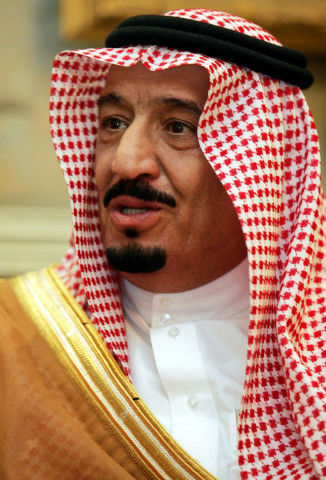Prince Salman named Saudi heir at time of turmoil
Crown Prince Salman likely to continue slow reforms. Prince Ahmed promoted to interior minister from deputy role.

Crown Prince Salman, 76, has built a reputation for pragmatism and is likely swiftly to assume substantial day-to-day responsibilities from a king 13 years his senior. Since the death of King Abdulaziz Ibn Saud, the country's founding father, the succession has moved along a line of his sons. Salman becomes Abdullah's third heir after the deaths of two older brothers: Crown Prince Sultan last October and Crown Prince Nayef, the interior minister, on Saturday.
The swift decision came as no surprise; analysts had already said they expected Salman to continue the gradual social and economic reforms adopted by King Abdullah as well as Saudi Arabia's moderate oil pricing policy. At stake is the future direction of a country that sits on more than one fifth of the world's proven global oil reserves.
As crown prince and later as king, Salman will have to tackle challenges ranging from an al Qaeda security threat to systemic joblessness at a time of unparalleled Middle Eastern turmoil, all set against a regional rivalry with Iran. Like other Sunni-Muslim-led Gulf monarchies, Saudi Arabia is nervous of the rise of militant movements such as Egypt's Muslim Brotherhood in the turmoil created by successive "Arab Spring" revolutions, as well as growing discontent among the region's Shia Muslim population groups.
"I would predict we will see more Saudi activity abroad, particularly considering what is going on throughout the Arab world today," said Jamal Khashoggi, a prominent former Saudi newspaper editor.
"Prince Salman is pragmatic; I think he will not mind dealing with militant Arabs like the Muslim Brotherhood." As crown prince, Salman will keep the defence portfolio and serve as deputy prime minister to King Abdullah, Monday's royal decree said.
Key post
From 1962 until last year, Prince Salman served as governor of Riyadh, a position that gave him more contact with foreign governments than many other senior royals. That role saw him arbitrating disputes between members of the ruling family, putting him at the centre of the kingdom's most important power structure.
He also had to maintain good relations with senior clerics and tribal leaders, meaning he has experience working with all the main groups that count in Saudi policy-making. The decree made no mention of the Allegiance Council, a family body that Abdullah set up to ensure smooth successions, which does not legally have to come into play until he dies.
Salman's younger brother Prince Ahmed was made Nayef's successor as interior minister after spending decades as his deputy. Prince Ahmed is seen as unlikely to alter security policies at a time when Saudi Arabia faces a threat from al Qaeda in neighbouring Yemen and unrest among its Shia Muslim minority. "He was always close to Prince Nayef, but he was more involved in administrative matters, not security. He has vast experience here," Khashoggi said.
Nayef built a formidable security apparatus that crushed al Qaeda inside the kingdom and is a vital element of a global struggle against militants. His services arrested thousands of suspected militants and successfully infiltrated militant cells, but came down hard on political dissent.
"Prince Nayef was not simply a lone figure on policies that have been pursued but was working as part of a consensus at the highest levels," said Robert Jordan, US ambassador to Riyadh from 2001 to 2003. Although an al Qaeda campaign last decade was suppressed, its survivors took shelter in neighbouring Yemen, where they have built the movement's most dangerous wing, dedicated to toppling the Saudi ruling family.
Analysts lay the credit for the rout of al Qaeda from the kingdom at the door of Prince Nayef's son, Prince Mohammed, whom militants came close to assassinating in 2010. The continued threat from al Qaeda, and Saudi Arabia's central role in battling the organisation, were underscored last month by an announcement in Washington that a bomb plot against Western targets put together in Yemen had been foiled.



















COMMENTS
Comments are moderated and generally will be posted if they are on-topic and not abusive.
For more information, please see our Comments FAQ